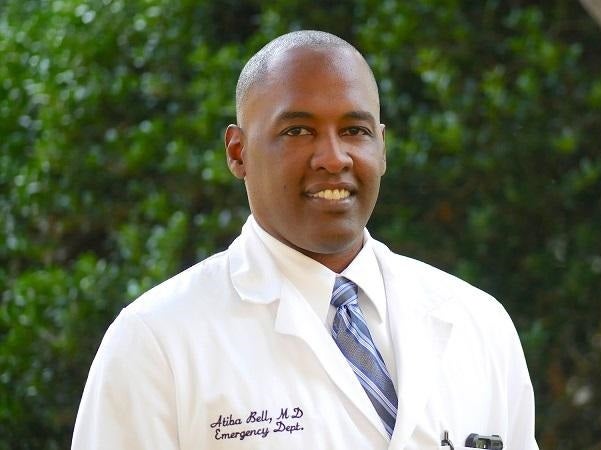Story of Atiba Bell M.D.

Dr. Atiba Bell, a GEMS Alumnus and Former Assistant Medical Director and Memorial Hermann SouthWest Houston, is practicing Emergency Medicine for Neighbors Emergency Health in Houston, Texas.
Growing up in Los Angeles, he was the oldest of three children. He played sports and worked a part time job through most of high school.
At what point did you consider medicine?
“I never considered it early on in my youth. When I was in high school, I actually used to practice my signature because I thought I would become a professional baseball player.”
Sports, for the longest time, were his passion. He played them relentlessly with friends and siblings. However, that all changed after he got injured on the field.
“It wasn’t until I got injured that I consider going into a health profession. Conversing with my physical therapist really began to change my mindset.”
After speaking with his physical therapist and asking him how he had gotten into the profession, he decided to pursue kinesiology. Due to his conversations with the therapist, he would soon begin thinking about becoming an orthopedic surgeon. The irony was, now that he was going to become a doctor, all of his earlier practice with handwriting would go to waste.
How did you hear about GEMS?
“The first year that I applied to medical school I got rejected. It was a pretty tough experience. The second time around, I got a pamphlet in the mail for the GEMS program. At first, I disregarded it, thinking that it wasn’t something that I particularly wanted. I wound up eventually applying anyway and, after making it in, was so grateful for my decision.”
Bell was at first awestruck at the fact that he was at Georgetown Medical School.
“When it came down to the program itself, I hadn’t yet fully understood the role that it would have in my life. I hadn’t formulated a clear picture of what it meant to be a GEMS student. I was surprised as to how far it propelled me further in my career, right from the beginning.”
Of course, participating in GEMS came with its challenges.
“Some of the early challenges involved trying to integrate a new system of learning with my own style. I had to learn how to appreciate the material that I was studying while balancing other obligations. I was newly married at the time and was apart from my wife for a year, so the longing for home combined with the new life was strange. I think my main adaptation, in retrospect, involved learning how GEMS was just the start of something much bigger to come in terms of practicing medicine and being responsible for the care of other people’s lives.”
Bell Started Georgetown Medical School the following year. He was fully prepared (as he confidently reflects) after surviving the GEMS program. It was a matter of continuing the process of learning and truly applying the knowledge gained, presentation skills, and confidence to his new role more directly in the clinical setting, especially as he began his clinical rotations.
“I use those same skills today as an ER physician. I look back on my GEMS education every time I engage in communication with other doctors and families. I have been able to build a reputation as a physician who approaches medicine in a consistent and driven manner. That means that I am always trying to learn, for the sake of my patients, how I can help and organize care for them in the best way.”
What recommendations would you have for future GEMS students?
“I can’t say that I wouldn’t have done anything differently. The mistakes that I made were what made me better. If you truly believe that you want to be a physician, that you deserve to be in medical school, and that you can do the work that it takes to become a physician, this is a time for you to fully embrace that dream and to invest in yourself and your education. Show the world that you can do it. Now is time for building a strong foundation that can really propel you into places that you’ve never gone before. And if that entails a year of investment and sacrifice and dedication to your education to achieve your final goal of getting into medical school, run head-long into it. Dream beyond medical school; prepare yourself for lifelong learning.”
